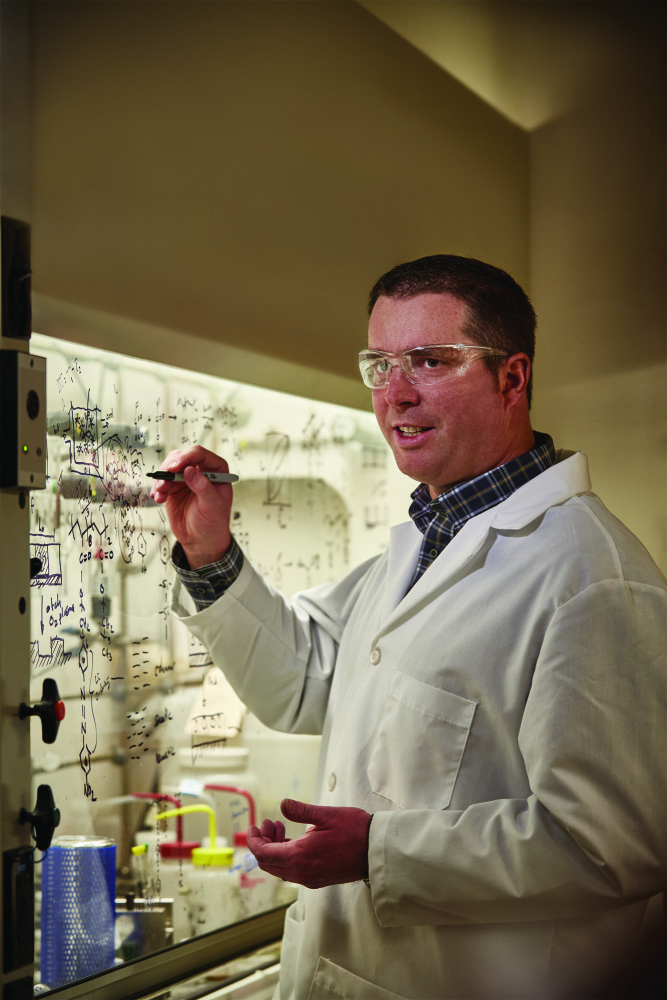The Welch Foundation, one of the nation’s largest sources of private funding for basic research, today announced that Christopher J. Ellison is the 2016 recipient of the Norman Hackerman Award in Chemical Research. A young associate professor in the McKetta Department of Chemical Engineering at The University of Texas at Austin, Ellison is being recognized as a “rising star” for his leadership, creativity and excellence in polymer science.

Chris Ellison, associate professor in the Cockrell School of Engineering’s McKetta Department of Chemical Engineering
“Ellison has a reputation in the scientific community for taking on some of the most palpable issues in polymer science and finding practical solutions that positively impact all of our lives,” said Charles W. Tate, director and chair of The Welch Foundation. “Although internationally recognized for his discoveries, Ellison is, first and foremost, a remarkable teacher. We are proud to honor him with this year’s Hackerman Award, and publicly thank him for his profound influence on the world of chemistry.”
As a professor in the Cockrell School of Engineering for nearly eight years, Ellison and his team have made several notable discoveries, uniquely combining chemistry and engineering. They revealed a new ‘green’ fiber manufacturing process that does not use heat energy or organic solvents, which are potentially toxic and must be recycled so they are not released into the atmosphere. The nonwoven, randomly oriented fibers created by Ellison’s team are used in healthcare, filtration and construction applications, to name a few. Ellison has also focused on increasing computer memory five-fold through the use of self-organizing molecules that complement traditional lithography processing.
Yet to date, Ellison’s most celebrated work produces safer flame-retardants for use on manufactured materials, such as the flexible foam in couches and mattresses. Previously used retardants are potentially toxic and can accumulate in the environment over time. Ellison discovered a biologically inspired molecule, called polydopamine, is as good as or potentially better than the artificially derived retardants currently on the market. His work with flame-retardants has been featured in prominent publications, including Popular Science, Newsweek, The Boston Globe, The Wall Street Journal and many others.
“What distinguishes our lab from many others is that we use chemistry to engineer materials in new forms,” Ellison said. “We look for fundamental, real-world applications that can potentially improve everyday life. So when experimental research moves toward commercialization for public gain, it’s really satisfying.”
Receiving the Hackerman Award is not Ellison’s first interaction with The Welch Foundation.
“I’ve had a Welch Foundation research grant for most of my time at UT, and much of my work would never have been possible without their funding,” Ellison said. “The Foundation is doing amazing things for researchers in the state of Texas and throughout the U.S. Their support has been invaluable.”
Ellison was born in Nebraska, received a bachelor’s of science in chemical engineering from Iowa State University and a Ph.D. in chemical engineering at Northwestern University. After working briefly as a senior scientist for a specialty chemicals company, he realized his passion for teaching and research.
“As an educator and scientist, I strive to create a highly collaborative, interdisciplinary environment that inspires great discoveries in the lab,” Ellison said. “Then, it is paramount that I serve as a strong communicator of that research. After all, a research team can be absolutely brilliant in their work, but if others can’t understand or appreciate their achievement, it doesn’t matter.”
Previous awards received by Ellison include the CAREER Award from the National Science Foundation, the Owens Corning Early Career Award, Young Investigator of the Polymeric Materials from the Science and Engineering Division of the American Chemical Society, the 3M Nontenured Faculty Award, the DuPont Young Professor Award and many more.
“Above all, winning the Hackerman Award validates my phenomenal students and postdoctoral fellows,” Ellison said. “This is for them.”
The Norman Hackerman Award in Chemical Research was established by The Welch Foundation to honor Norman Hackerman, its Scientific Advisory Board chair from 1982 to 2006. The award recognizes the accomplishments of chemical scientists in Texas who are early in their careers. It is designed to encourage scientists who are embarking on careers dedicated to increasing our fundamental understanding of chemistry.
The Welch Foundation, based in Houston, is one of America’s largest private funding sources for basic chemical research. Since 1954, the organization has contributed to the advancement of chemistry through research grants, departmental programs, endowed chairs, and other special projects at educational institutions in Texas.
